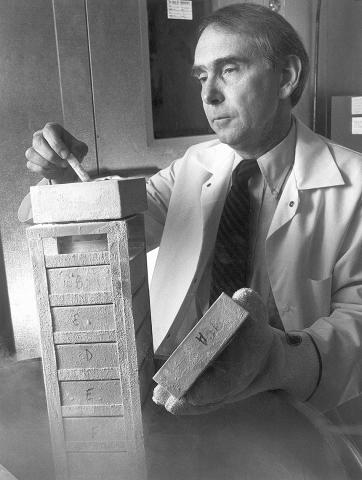NINDS Mourns International MS Expert McFarland
Scientist emeritus and international multiple sclerosis expert Dr. Henry McFarland, a longtime stalwart researcher at the National Institute of Neurological Disorders and Stroke (NINDS), died Jan. 11 at age 83.
McFarland was world-renowned for his research on multiple sclerosis (MS), a debilitating neurological disease characterized by the destruction of the insulating myelin sheath surrounding nerve cells. He distinguished himself for his discoveries using MRI to identify MS treatments. His contributions to research on the disorder laid the groundwork for efficient testing of disease-modifying therapies and for applying new techniques and technologies to research.

“Henry made a significant impact during his lifetime, not only on the millions of individuals living with MS, but on the culture of NINDS and the field of neurology,” said NINDS Director Dr. Walter Koroshetz. “He helped set the tone for the spirit of kindness, collaboration and discovery that we hold so dear. To those who knew him, he was an innovative thinker, dedicated mentor and warm and humorous friend.”
Born in Pennsylvania and raised in Arizona, McFarland earned his bachelor’s degree from the University of Arizona and his medical degree from the University of Colorado. A lecture on the lymphocytic choriomeningitis virus, during his residency at Thomas Jefferson Medical College in Philadelphia, sparked McFarland’s interest in neurovirology and led to his career in neuroscience. After completing his clinical training, he went on to do postdoctoral studies as an NIH special fellow in neurovirology at Johns Hopkins University School of Medicine and in immunology at University College in London, England.
From 1973 to 1975, McFarland served as assistant professor of neurology at Johns Hopkins Hospital. He joined NINDS in 1975 as deputy chief of the Neuroimmunology Branch (NIB)—which he helped to establish—and was later appointed branch chief in 1994.
McFarland spent more than three decades with NINDS. During that time, he conducted research in a variety of areas including genetics, clinical trials and imaging. His work spanned various topics such as the role of viruses—and immune responses to those viruses—in chronic neurological diseases, as well as the cellular immune response in MS.
In addition to his research, he trained many young scientists from all over the world.
“Henry taught me so much about neurology, caring for patients and so much more,” said Joan Ohayon, a clinical research project manager in NINDS’s Division of Clinical Research. “He was respected and loved by many. Very few people really make a true impact in this world—but he was one of them.” McFarland hired Ohayon, who is also a family nurse practitioner, in 1997.
McFarland’s primary scientific contribution was in the integration of MRI technology into MS research; his work led to both innovative trial designs and a deeper understanding of the disease. This research laid the foundation for accurately predicting treatment efficacy in phase 3 trials, resulting in the approval of more than two dozen disease-modifying therapies for relapsing MS.

Between 2002 and 2007, McFarland served as NINDS’s clinical director and was instrumental in the founding of both the NIH Neuroscience Nurse Internship Program and NINDS training programs for American Indian and Alaska Native scientists.
In his leadership roles, he was known for approaching employees to ask, “Is everyone happy?” and “What have you discovered today?” He was committed not only to challenging his staff and mentees but also to cultivating them as well.
“Henry was a wonderful clinician-scientist and human being and deeply committed to the NINDS Intramural Research Program,” said former NINDS Director Dr. Story Landis. “I was very grateful that he was willing to become the clinical director in addition to running NIB.”
An internationally recognized leader in the field of neuroimmunology, McFarland received numerous awards for his research accomplishments, including the John Jay Dystel Prize—sponsored by the American Academy of Neurology and the National Multiple Sclerosis Society—in 1998, the Public Health Service Physician Clinical Researcher of the Year in 1996, and the 2003 Charcot Award for a lifetime achievement in MS research.
Although he retired in June 2009, McFarland continued his research at NIH as a scientist emeritus. His impact extended beyond his retirement through advisory roles with MS-focused organizations.
“Henry leaves a towering legacy of scientific contributions and mentorship of future leaders in the MS community,” said Dr. Tim Coetzee, chief advocacy, services and science officer at the National MS Society. “We are grateful for the many contributions that he made to the work of the National MS Society—a remarkable life and legacy that is making life better for people with MS today and in the future.”
McFarland will be missed by all who knew him and by those who benefitted from his extensive work to improve the lives of people with neurological disorders. He leaves behind his beloved wife Karen, their son Paul, and two granddaughters, Elizabeth and Alison.
